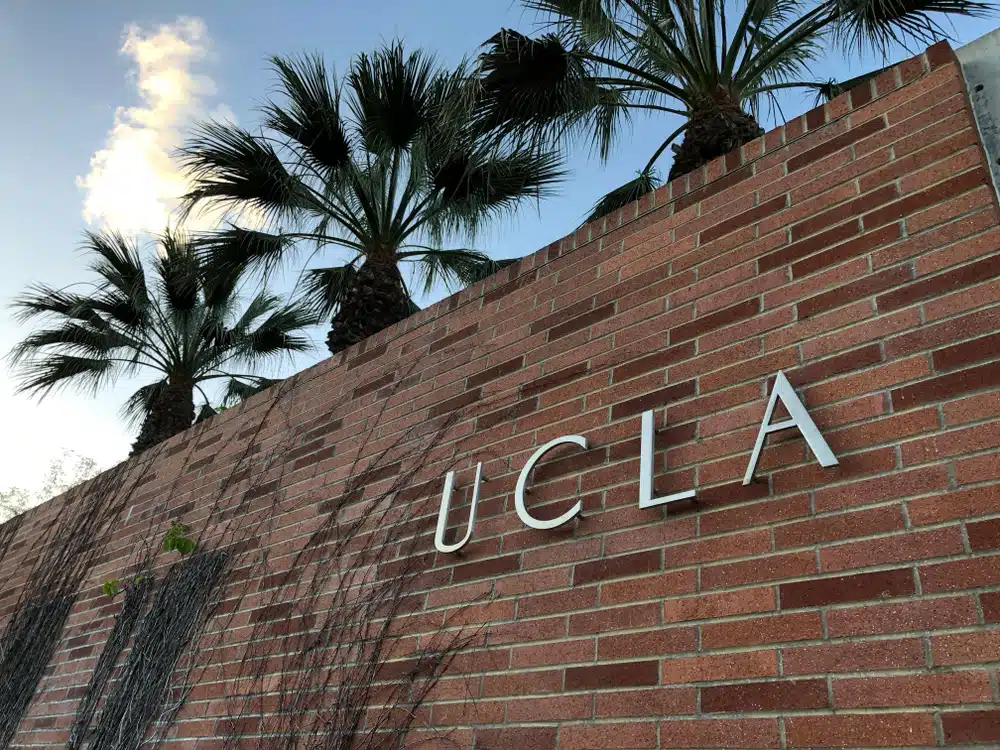When applying to UCLA, one of the most important factors in your application is your GPA. As one of the most competitive universities in the country (the school’s latest acceptance rate is only 9%), UCLA evaluates students based on both unweighted and weighted GPAs, considering the rigor of their coursework.
But how exactly does UCLA calculate GPA? In this guide, we’ll break down the UCLA GPA scale, explain what GPA you need to be a competitive applicant, and provide tips to boost your chances of getting into the school.
- What Is the UCLA GPA Scale?
- Other Types of Grades at UCLA
- How to Get into UCLA
- Frequently Asked Questions
- Takeaways
What Is the UCLA GPA Scale?
UCLA uses a letter-grading system for calculating their students’ grade point average (GPA). Your GPA is calculated by dividing the number of grade points earned by the number of units attempted. So, the total grade points earned for a course you took would equal the number of grade points assigned to that course times the number of course units.
Here’s a peek into how their grading scale works:
| Grade | Grade Points
per Unit |
| A+ | 4.0 |
| A | 4.0 |
| A− | 3.7 |
| B+ | 3.3 |
| B | 3.0 |
| B− | 2.7 |
| C+ | 2.3 |
| C | 2.0 |
| C− | 1.7 |
| D+ | 1.3 |
| D | 1.0 |
| D− | 0.7 |
| F | 0.0 |
To maintain a satisfactory standing at UCLA, undergraduate students need to maintain a 2.0 GPA or C, its grade letter equivalent. Grades earned in regular sessions, summer sessions at any UC campus, and UCLA Extension courses are the only ones included in the computation for your grade-point average. So, grades earned at other institutions will not affect your GPA.
UCLA also uses plus (+) and minus (-) suffixes to raise or lower the grade-point value. However, getting an A+ is an exception to this rule since it carries the same number of grade points as the A grade. This means that the highest grade you can get at UCLA is an A+ or an A. Meanwhile, receiving an F would mean that you failed the course.
Other Types of Grades at UCLA
Aside from their standard letter grades, UCLA also gives out other types of grades like P, NP, and I. Some of these special grade types are considered a privilege for those doing well academically. Meanwhile, others are given under special circumstances and are judged on a case-to-case basis. Let’s find out more about these other types of grades.
Passed and not passed grades
Passed (P) and not passed (NP) grades can be obtained by undergraduate students who are in good standing and have enrolled in at least 12 units. Take note that you can only enroll in one course each term on a P/NP basis. If you didn’t avail of this option in the preceding term, you can enroll in two courses for that current term.
The P grade is given if you achieve a letter grade of C or better. Meanwhile, you won’t receive any units or course credit if you get a grade of NP. Honestly, we think it’s a good idea to consider this system because units earned this way can count toward your degree requirements while leaving your GPA untouched.
Incomplete grades
A grade of incomplete (I) can also be given when your work is of passing quality but incomplete because of a valid reason, like an illness or other serious problems. It will also stay on the transcript along with the passing grade you may receive for that course later.
Keep in mind that if the need ever arises, it will be your responsibility to discuss with your instructor the possibility of obtaining an I grade instead of a non-passing one.
If they agree, you can receive unit credit and grade points by completing the coursework they assign. Take note that if you fail to complete the work by the end of the next full term in your residence, your I grade will lapse to either an F or NP. More importantly, remember that you should not re-enroll in the course because if you do, it will be recorded twice on your transcript.
How to Get into UCLA
Like other campuses under the UC university system, UCLA’s evaluators use a process called the 13-Factor Comprehensive Review System. These include a variety of criteria which covers your academic performance, accomplishments, special projects, and even the locations of your home and high school.
However, even though this system takes into account a wide range of factors, remember that academic achievements are still placed as the highest priority in the evaluation.
UCLA also focuses on applicants’ personal qualities and whether or not they took advantage of their opportunities in the midst of their hardships or unusual circumstances, if any.
Also, take note that some colleges have special or additional considerations. For example, the School of Nursing requires the submission of an additional supplemental application. Meanwhile, the UCLA College of Letters and Science doesn’t consider your major during the review process.
1. Meet UCLA’s GPA requirements.
While no certain GPA will guarantee your admission to their university, you still need to meet the minimum UCLA GPA requirements to be eligible for applying. Students who live in California need to have at least a 3.0 GPA. Meanwhile, nonresidents can only apply with a 3.4 GPA or higher.
Now, you may be wondering, say, can I get into UCLA with a 3.7 GPA? While this meets their minimum criteria, take into account that recently admitted students at UCLA had an average GPA of 3.93. Our advice is to aim for a similar or even higher GPA to have a stronger application and a higher chance of admission.
Keep in mind that evaluators pay the most attention to your junior year GPA, so be sure to choose the right courses and utilize your school resources.
2. Build a good academic record
To fulfill UCLA’s minimum admission requirements, you need to complete 15 year-long high school courses with a grade of C or higher, with at least 11 of these courses finished before your final year of high school.
Here are the minimum A-G requirements for the UCLA admission process:
- 2 years of history/social science
- 4 years of college-preparatory English
- 3 years of mathematics (4 years recommended)
- 2 years of laboratory science (3 years recommended)
- 2 years of a language other than English (3 years recommended)
- 1 year of visual and performing arts (if available)
- 1 year of a college-preparatory elective
3. Showcase your extracurriculars.
Your UC Application will also have to include your activities and awards, so it would be best to put the ones you’re most proud of. By selecting the extracurriculars you’re most passionate about, the UCLA admissions team will be able to get a better idea of your character and what makes you stand out.
Take note that some of the top qualities they look for in applicants are dedication, leadership, and creativity.
Some great examples of extracurriculars you can include are student government involvement, sports activities, and community service experience. If you have awards and achievements, or special talents and niche interests, it is also recommended to mention these in your application. Remember, put more importance on the quality of your extracurriculars, not the quantity.
4. Craft heartfelt responses to the Personal Insight Questions.
Your answers to the UCLA Personal Insight Questions (PIQs) are another key component of having an amazing application.
Here are the 8 UC Personal Insight Questions you can choose from:
- Describe an example of your leadership experience in which you have positively influenced others, helped resolve disputes, or contributed to group efforts over time.
- Every person has a creative side, and it can be expressed in many ways: problem-solving, original and innovative thinking, and artistically, to name a few. Describe how you express your creative side.
- What would you say is your greatest talent or skill? How have you developed and demonstrated that talent over time?
- Describe how you have taken advantage of a significant educational opportunity or worked to overcome an educational barrier you have faced.
- Describe the most significant challenge you have faced and the steps you have taken to overcome this challenge. How has this challenge affected your academic achievement?
- Think about an academic subject that inspires you. Describe how you have furthered this interest inside and/or outside of the classroom.
- What have you done to make your school or your community a better place?
- Beyond what has already been shared in your application, what do you believe makes you a strong candidate for admissions to the University of California?
Since you can only choose four out of the eight questions they will provide, you need to pick the ones that are most relevant to you and your interests. Keep your answers genuine but concise, especially since you will only have a 350-word limit.
One tip for creating your responses is to highlight your achievements, background, interests, and how you can enrich the UCLA campus. You should also write in a persuasive manner and use the first-person point of view since these can help create a unique voice, making you stand out to admission evaluators.
If you aren’t used to crafting essays, you should practice answering the PIQs in advance. You may also seek the help of a college essay expert.
Frequently Asked Questions
1. What GPA do I need to get into UCLA?
While UCLA’s minimum GPA requirement is 3.0 for California residents and 3.4 for nonresidents, most admitted students have a GPA closer to 3.93. Aiming for a high GPA, particularly in your junior year, will strengthen your application.
2. Does UCLA accept weighted GPAs?
Yes, UCLA considers both unweighted and weighted GPAs. A weighted GPA includes extra points for honors, AP, or IB courses, which can make your application more competitive.
3. Can I get into UCLA with a 3.7 GPA?
While a 3.7 GPA meets the minimum requirement, UCLA is highly competitive, and the average GPA of admitted students is higher. A strong application with rigorous coursework, extracurriculars, and compelling personal insight responses can help improve your chances.
4. What are UCLA’s A-G requirements?
UCLA requires students to complete 15 year-long high school courses with a grade of C or better. These include history/social science, English, mathematics, laboratory science, a foreign language, visual/performing arts, and an elective.
5. How important are extracurricular activities in the UCLA admissions process?
Extracurricular activities play a significant role in UCLA’s holistic admissions review. Leadership, dedication, and passion in activities such as sports, student government, or community service can make your application stand out.
Takeaways
- UCLA is extremely competitive, with an average admitted student GPA of 3.93. Meeting or exceeding this benchmark significantly improves your chances of admission.
- UCLA follows a letter grading system with plus and minus suffixes. An A+ and an A both carry 4.0 grade points, while an F results in 0.0 points, impacting your overall GPA.
- To be eligible for admission, students must complete 15 A-G high school courses, including math, science, English, and more, with at least a C grade.
- Showcasing leadership, passion, and dedication through extracurricular activities can help set you apart in the admissions process.
- Want to improve your UCLA chances? An admissions coach can help you navigate the competitive process and highlight your strengths. Reach out for expert guidance!


































